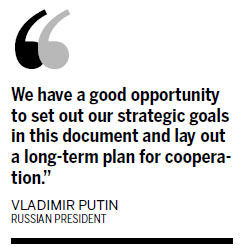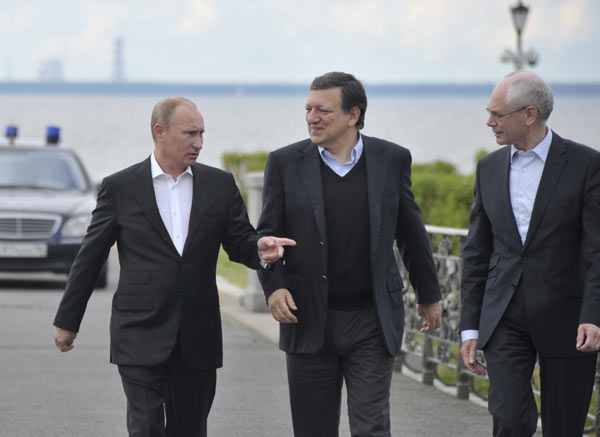Putin urges cooperation plan with EU ahead of Beijing visit
Updated: 2012-06-05 08:08
By Agencies (China Daily)
|
|||||||||||
|
Russian President Vladimir Putin speaks to European Commission President Jose Manuel Barroso (center) and European Council President Herman Van Rompuy (right) during their meeting in Strelna, outside St Petersburg, on Sunday. Putin arrives in Beijing on Tuesday. Alexei Nikolsky / Ria Novosti / Kremlin / Reuters |

Russian President Vladimir Putin arrives in Bejiing on Tuesday and will attend the Beijing summit of the Shanghai Cooperation Organization from Tuesday to Thursday.
Before coming to China, Putin said the European Union must shed "stereotypes" about Russia and called for fast progress on visa-free travel between his country and the EU on Monday at a summit overshadowed by the crisis in Syria.
Putin's stance on Syria and appetite for closer ties with Russia's largest trading partner were in the spotlight at his first summit with the EU since he returned to the Kremlin last month for a six-year term.
Moscow has blunted Western efforts to condemn Syrian President Bashar al-Assad and push him from power during 15 months of bloodshed Western nations blame on his government, whose forces have killed at least 9,000 people.
Both Russia and Europe say they still support Kofi Annan's UN-backed peace plan, but EU nations would like Russia to press Assad harder to abide by a ceasefire demanded by the plan, and want him to step aside as part of a political transition.
EU foreign policy chief Catherine Aston said on Sunday that the crisis had reached a "critical point" and that Russia's role was "crucial" to a solution.
Russia says it is not protecting Assad, who has given Moscow its firmest Middle East foothold, but that the Syrian leader's exit cannot be a precondition for political dialogue.
Putin focused on the Russia-EU relationship as he opened Monday's meetings, saying the wary neighbors should push to make progress toward a elusive new framework pact to govern their ties after four years of talks.
"We have a good opportunity to set out our strategic goals in this document and lay out a long-term plan for cooperation," he said at the talks in the ornate imperial-era Constantine Palace on the outskirts of his hometown of St. Petersburg.
But he called for a "pragmatic, businesslike approach without any ideological or other stereotypes", a veiled warning to the EU to treat Russia as an equal and steer clear of preaching on political issues.
Russia and the EU are deeply intertwined, with Europe relying heavily on Russian energy exports and Russia buying EU products from German cars to Italian olive oil and Scandinavian furniture for a growing middle class.
Wary neighbors
But they wrangle over issues ranging from energy supplies, trade and market access to human rights, hampering efforts to agree a new framework pact.
Russia has criticized EU regulations designed to liberalize its gas market by barring suppliers including Russian giant Gazprom from controlling transit pipelines.
Putin, in power for 12 years and keen to shed an image of Russia as an unwelcome neighbor, has long pursued the goal of visa-free travel for Russians to the EU.
"A true partnership is impossible when there is a visa barrier," he said at the start of the talks with European Council President Herman Van Rompuy and European Commission President Jose Manuel Barroso.
The criticism over market access cuts both ways.
Russia is to join the World Trade Organization this year, binding it to global rules, but the EU wants the Kremlin to lower barriers for Western companies and investment by curbing corruption and improving the rule of law.
Some EU officials are concerned Putin's return to the presidency will mean more state interference in the economy and slower reforms.
Putin, who has faced the biggest opposition protests of his rule, has warned against Western meddling and has emphasized integration among former Soviet republics is a chief priority.
He made Belarus the first foreign destination of his new term, backing an authoritarian leader under EU sanctions. He leaves for Uzbekistan shortly after the summit.
Putin ceded no ground on Syria in remarks during visits to Berlin and Paris on Friday, placing an accent on rebel violence, criticizing sanctions and saying political decisions could not be forced upon the country from outside.
Ashton, who met Russian Foreign Minister Sergei Lavrov on Sunday, said the EU wanted to "work closely with Russia to find a way to end the violence" and that "Russia's role is crucial for the success of Annan's plan".
The statement said she spoke to Annan by phone on Sunday and that they agreed the crisis had reached a "critical point".
Lavrov set a constructive tone in his own phone call with Annan, saying that to support the plan Moscow "will be ready to consider various scenarios of further work" that would help to coordinate international efforts on Syria, his ministry said.
However, when asked whether he expected the summit to narrow the gap on Syria, Lavrov told reporters: "I don't think so."
Reuters - Xinhua
Today's Top News
President Xi confident in recovery from quake
H7N9 update: 104 cases, 21 deaths
Telecom workers restore links
Coal mine blast kills 18 in Jilin
Intl scholarship puts China on the map
More bird flu patients discharged
Gold loses sheen, but still a safe bet
US 'turns blind eye to human rights'
Hot Topics
Lunar probe , China growth forecasts, Emission rules get tougher, China seen through 'colored lens', International board,
Editor's Picks

|

|

|

|

|

|






